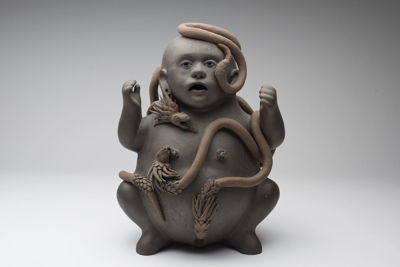Kukuli Velarde
Title: Bites Will Not Trust Like Tough Love
Peruvian Kukuli Velarde makes work indebted to folk tradition and traditional ornamentation, exploring the new politics of identity, estrangements of context and acts of “forgetfulness” that occur as art is displaced from its origin. ‘Bites. Will Not Trust. Like Tough Love’ reveals itself as awakened in its situation, the mythic figure of half-bull, half-man caught uncertain, pulled from privacy, in its beautifully lifelike visage. The artist projects her own image onto the creature with the use of a head cast to reclaim the objects identity, and inherits and absorbs the (racially motivated) belittling title that reflects ongoing derogatory behaviour towards Latin America and its women.
Title: Culebreando
Part of the The Isichapuitu Series. Peruvian Kukuli Velarde makes work indebted to folk tradition and traditional ornamentation, exploring the new politics of identity, estrangements of context and acts of “forgetfulness” that occur as art is displaced from its origin. ‘Culebreando’ is cut from a series of works exploring memory, fear, desire and ideology through figurative icons that, in tandem, present a larger picture of the artists identity and belief in a shared system of traits. Choosing a simple white glaze, Velarde adds graffitied text and image across the figurative body that slide between allusions to harm or violence and emotional upheaval — words such as ‘miedo de caer pero’ (fear of falling’) or ‘corazón no suede’ (‘heart can not’) tattood across the chest, and the repeated symbol of the serpent is knowingly deployed in reference to feminine temptation and the suffering inflicted by that notion.
Title: Entangled
'ISICHAPUITU (MELANCHOLY, FLAKY, NETA, Peruvian Kukuli Velarde makes work indebted to folk tradition and traditional ornamentation, exploring the new politics of identity, estrangements of context and acts of “forgetfulness” that occur as art is displaced from its origin. ‘Entangled’ is cut from a series of works exploring memory, fear, desire and ideology through figurative icons that, in tandem, present a larger picture of the artists identity and belief in a shared system of traits. The snake rears in appearance over several of these figures in the “Isichapuitu” series as Velarde — albeit here a transformed, mythic vision of the serpent — and surrounds the figure in a suffocating, controlling mass. ENTANGLED, CULEBREANDO), 1998-2001 glazed earthenware each 24 in. (61 cm.) high (5) Sheboygan, Kohler Arts Center, Kukuli Velarde: Cantaros de Vida (The Isichapuitu Series), 2002.
Title: Isichapuitu
Peruvian Kukuli Velarde makes work indebted to folk tradition and traditional ornamentation, exploring the new politics of identity, estrangements of context and acts of “forgetfulness” that occur as art is displaced from its origin. ‘Isichapuiti’ is cut from a series of works exploring memory, fear, desire and ideology through figurative icons that, in tandem, present a larger picture of the artists identity and belief in a shared system of traits. This piece is particularly exposed, the filigree found etched into the ceramic of other figures in this series having been left out in favour of a simple, smooth dark skin. The strange reduction and decentralisation of the female form is only recognisable by its sexual interface and coded use of flowers, the otherwise raw clay punctured with fresh stigmata pick out in a vivid, glossy red that speaks of silent pain & suffering.
Title: La Neta
Peruvian Kukuli Velarde makes work indebted to folk tradition and traditional ornamentation, exploring the new politics of identity, estrangements of context and acts of “forgetfulness” that occur as art is displaced from its origin. ‘LA Neta’ is cut from a series of works exploring memory, fear, desire and ideology through figurative icons that, in tandem, present a larger picture of the artists identity and belief in a shared system of traits. The sculpture seems dreamlike and more hopeful than many within the ‘Isichapuitu’ set, the ceramic finished in a deep blue glaze and gold enamel that reflects an attractive lustre. Flames or leaves erupt along the surface in a suggestion of sexual vitality or growth, whilst lucid verse traces ribbon-like from the figures mouth and down across its circumference — and speaks of time, origins and discovery. 'ISICHAPUITU series, 1998-2001 glazed earthenware 24 in. (61 cm.) high (5) Sheboygan, Kohler Arts Center, Kukuli Velarde: Cantaros de Vida (The Isichapuitu Series), 2002.
- 1
- 2







